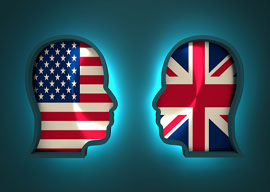
January 27, 2017

Source: Bigstock
Theresa May is clearly delighted to be the first foreign leader to meet President Trump and has been trotting out the ritual “Special Relationship” phrase, one that makes many of us cringe with embarrassment. It’s like that other cant boast”that the United Kingdom “punches above its weight”; a preference for illusion rather than the acceptance of reality. Of course, Mrs. May and Mr. Trump have the English language in common, and this makes conversation easier than Mr. Trump will find it with his other “best friend,” President Putin.
They have other things in common also. Mr. Trump has proclaimed his approval of Brexit, and Mrs. May, as a recent convert to the cause, has become an enthusiastic Brexiteer. Indeed, like many converts, she seems to have become “more Catholic than the Pope,” and those who suggest that she embraced Brexit only in order to become prime minister are probably world-weary cynics. Admittedly it’s only seven months ago that she was campaigning on the Remain side in the E.U. referendum, but since she is an honest churchgoing woman, we must assume that, like St. Paul on the road to Damascus, she has indeed experienced a life-changing conversion.
Another thing they have in common is that a year ago few would have expected either to be where they are now. Last January the odds were against Mr. Trump entering the White House except as a guest, while nobody then imagined that Mrs. May would be the next leader of the Conservative Party and prime minister. Indeed many thought she was very lucky to have kept the job of Home Secretary when David Cameron formed his new government after the general election in May 2015. But there you are: The dice have fallen, and Mr. Trump and Mrs. May are evidently favorites of Fortune. So they have a good deal to congratulate each other on.
Nevertheless, once the pleasantries have passed, things may become a tad more awkward. Mr. Trump has declared himself to be a protectionist and a critic, if not an open enemy, of globalization. Almost his first act as president has been to scrap the Trans-Pacific Partnership. Mrs. May, on the other hand, appears to have embraced the Brexiteers” vision of Britain as a global free-trading state, and done so with all the zeal of the convert.
There are difficulties here. By no means did all who voted to leave the E.U. see the future in those terms. Many, especially in the north of England, felt themselves to be victims of globalism, which had destroyed industries and forced unwelcome social change on their towns and cities. They have indeed more in common with Mr. Trump and many who supported him than they have with Mrs. May and the free-market Brexiteers.
Now, there is of course a good case to be made against globalization and in favor of protection. Globalization may indeed make the world richer; it may indeed be helping countries in what we used to call the Third World to emerge from poverty and enjoy rapid economic growth. Few would deny this. There are lots of winners from globalization, and not only in poor or once-poor countries. It’s been good for corporations, it’s been good for banks and corporate lawyers, and it’s been especially good for the profits of manufacturers who have been able to switch production to low-cost economies. Brilliantly successful companies like Apple may design their products in the U.S., but they don”t make them there.